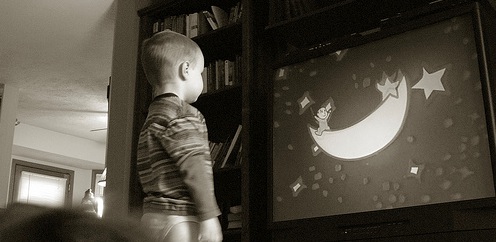Digital Literacy and the ‘Digital Society’

Sometimes you come across a passage in a book or article that puts into words what you’ve been thinking for a while. Today, whilst studying for my Ed.D. that’s exactly what happened. I’m working my way through Lankshear & Knobel (eds.) Digital Literacies: concepts, policies and practices at the moment and am up to Allan Martin’s excellent article entitled Digital Literacy and the “Digital Society” (hence the title of this post).
In it, Martin hits a nail firmly on the head when he talks about the crumbling of existing structures that give meaning such as family units, church and, to some extent, the state. In the place of these, he quite rightly asserts, individuals tend to define themselves by what they consume – usually in the way of media. It’s a lengthy quotation that I’m going to share, but definitely worth it!
Society is being transformed by the passage from the “solid” to the “liquid” phases of modernity, in which all social forms melt faster than new ones can be cast. They are not given enough time to solidify and cannot serve as the frame of reference for human actions and long-term life-strategies because their allegedly short life expectation undermines efforts to develop a strategy that would require the consistent fulfillment of a “life-project.” (Bauman, 205, p.303)
For those who do not belong to the global elite, life has become an individual struggle for meaning and livelihood in a world that has lost its predictability… Consumption has become the only reality, the main topic of TV and of conversation, and the focus of leisure activity. The modes of consumption become badges of order, so that to wear a football strip of a certain team (themselves now multinational concerns) or a logo of a multinational company become temporary guarantors of safety and normality.
In this society, the construction of individual identity has become the fundamental social act. The taken-for-granted structures of modern (i.e., industrial) society – the nation state, institutionalized religion, social class – have become weaker and fuzzier as providers of meaning and, to that extent, of predictability. Even the family has become more atomized and short term. Under such conditions individual identity becomes the major life-project. You have to choose the pieces (from those available to you) rather than having them (largely) chosen for you. In this context, awareness of the self assumes new importance, reflexivity is a condition of life; a life that needs to be constantly active and constantly re-created. And care is needed, because each individual is responsible for their own biography. Risk and uncertainty have become endemic features of the personal biography, and individual risk-management action is thus an essential element of social action (Beck, 1992, 2001). The community can be no longer regarded as a given that confers aspects of identity, and the building of involvement in communities has become a conscious action-forming part of the construction of individual identity. Individualization has positive as well as negative aspects: the freedom to make one’s own biography has never been greater, a theme frequently repeated in the media. But the structures of society continue to distribute the choices available very unequally, and the price of failure is greater since social support is now offered only equivocally.
This certainly resonates with my experience, especially of teenagers. I believe, as Martin later argues, that it’s our job as teachers to instil in youngsters the digital literacy/competence/fluency (whatever you want to call it!) to be able to critically and reflectively deal with media and the digital world.
Does this resonate with YOU too? 😀
(image credit: mesmerised by Joe Thorne & Flickr)
